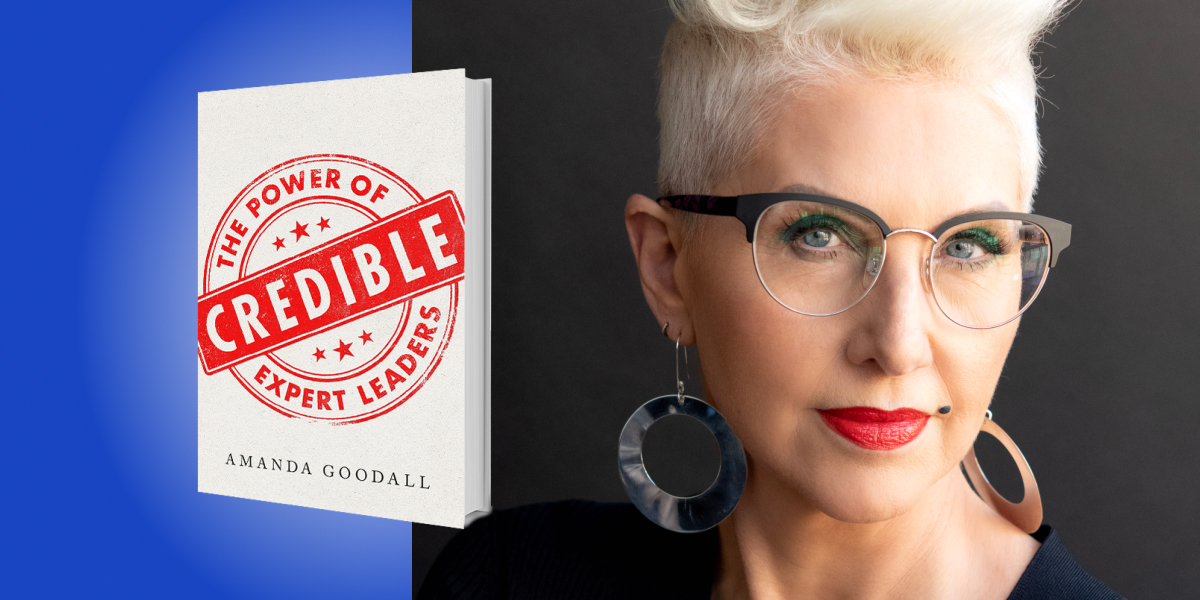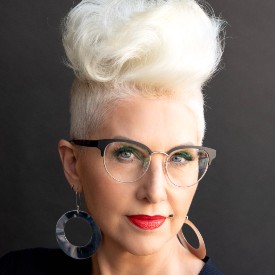Amanda Goodall is a professor of leadership at Bayes Business School in London, and has been researching, publishing, and communicating on expert leadership for nearly two decades. Her work has been covered extensively by the media including the New York Times, Financial Times, The Guardian, BBC, Times of London, and Bloomberg.
Below, Amanda shares 5 key insights from her new book, Credible: The Power of Expert Leaders. Listen to the audio version—read by Amanda herself—in the Next Big Idea App.

1. We need credible core business experts (not generalists) to lead organizations.
Core business experts lead and manage the world’s best-performing organizations. Being able to walk the proverbial walk is critical. Simply being a competent general manager is insufficient.
Over the last 20 years, I have rigorously researched CEOs and line managers in all types of workplaces. For example, every boss in every company over an 18-year period in Denmark. I’ve also looked at hospitals in the U.S. and found that those led by physicians outperform hospitals run by general managers; NBA basketball coaches who were outstanding players led their teams to greater success; tech companies, universities, professional service firms, Formula 1 racing teams, and high schools all perform better when their leaders are those who have acquired a profound understanding of the business and a mastery of the core activity. Credible core business experts make the best leaders.
“The term expert is not elitist.”
The importance of expert leadership applies to all industries and sectors. From the brilliant teacher who inspired students before moving up and inspiring the whole school, to the masseuse who spent years working for others before opening her own spa, to the engineer who joins Mercedes as a trainee and eventually becomes its CEO.
We need expert leaders at all levels of the organization. The term expert is not elitist. It’s not just about the professions, like medicine or law. It refers to anyone who has mastered a trade to a high standard, such as a talented chef who opens a restaurant, journalists at newspapers, and carers in care homes—people without whom their organization simply could not function.
2. Why aren’t all organizations led by core business experts?
The managerial class has grown substantially since the 1960s. With it, there has been a devaluing of genuine expertise. Managerialism has often replaced domain-specific judgment and reasoning, and management has been reduced to a collection of skills and techniques which replace expertise acquired throughout a career. Generalist bureaucrats often put systems in place that require yet more generalist bureaucrats to run them. Managerialism, metrics, process bureaucracy, and the rise of general managers all became prevalent in education, health care, policing, the military, business, and across government. Think of the time-wasting box ticking done by doctors, teachers, social workers, and many others.
Business schools have played their part in this unfortunate shift towards generic management. Neither intelligence nor an MBA can substitute for expert knowledge and experience. When the right leadership training is matched with professional knowledge, the best leaders and managers are developed. This is why I run a leadership program designed specifically for physicians.
3. How do expert leaders achieve great organizational performance?
Expert leaders are able to develop a clear sense of purpose, and this shapes their organizational strategy, which is aligned with the core business. As a young man in the 1920s, Soichiro Honda fixed bicycles in his father’s repair shop before starting an apprenticeship in Tokyo at fifteen. He was a talented mechanic whose technical skills flourished after opening his own business. Soon, Honda was manufacturing piston rings for engines. In 1946, he created the Honda Technical Research Institute, which is where he designed engines that turned his motorized bicycles into motorcycles. Soichiro Honda was intrinsically motivated. His own technical expertise, innovation, and love of engineering drove Honda’s corporate strategy. As an expert leader, he stayed centrally engaged, even test-driving new vehicles right up to his retirement in 1973.
Expert leaders also take the long view, reflected in their investment in research and development, and pursue sustainability with a commitment to excellence. This is arguably what Emerson Electric has done. Emerson was established in St Louis, Missouri in 1880. Incredibly, the company is on only its fourth CEO since 1954. Each spent almost his entire career at Emerson prior to becoming head, and each did the job for twenty years. Two decades as CEO; imagine the kind of stability and opportunities to plan strategically this offers. Emerson has resisted short-termism, unlike so many companies, and they have reaped the benefits. Emerson Electric (EMR) outpaces Stock Market gains, read a Nasdaq headline in April 2022. Its performance has been exemplary.
“It is the leader’s responsibility to establish the quality threshold in an organization.”
Expert leaders must themselves perform to a high standard. This sets the bar high for existing workers, new hires, and internal promotion. It is the leader’s responsibility to establish the quality threshold in an organization. If an outstanding expert is hired as CEO, then the bar is automatically raised. I interviewed Patrick Harker when he was dean of the Wharton School of Business, and he opened my eyes to the importance of expert leaders for hiring and raising standards. He said, “To be credible, the standard bearer must first bear the standard.” In other words, if you want to reach a higher high for your organization, you must have reached it yourself, and be seen by others to have done so. This signals excellence like a quality beacon to potential new talent, to non-executive directors, donors, investors, and the market. For example, in trying to create a world-renowned biomedical research center, the Francis Crick Institute selected Sir Paul Nurse, a geneticist and Nobel Prize winner, to head it. Naturally, Paul Nurse also had to understand how to motivate people, manage, and lead.
4. How do expert line managers raise employee job satisfaction and retention?
The wheels of organizational performance are oiled by line managers who make up the bulk of the world’s supervisors. Bosses matter intensely. Our research revealed that a person’s immediate boss has the largest effect on job satisfaction and that expert bosses have the greatest positive influence on employee happiness and retention—the effect was double that of earnings. Naturally, we want satisfied workers, but it’s also important because a growing number of studies show that happy workers are substantially more productive.
How do expert bosses create happier workers? We found that expert line managers (those who really understand the nature of an employee’s job) create productive work environments by setting appropriate goals, giving informed feedback, motivating through shared values, communicating goals clearly, supporting staff in developing their careers, consulting with their teams about workflow, engaging in innovative thinking, allowing more autonomy, engendering trust in senior management, and creating a safer environment. Importantly, they lead by example.
5. What do the best expert-friendly organizations do?
To achieve a business of experts, the best organizations incorporate these characteristics:
- They have a company philosophy that affirms the value of expertise and actively seeks to grow it. Culture is a tool for allowing expertise to permeate the organization.
- They enable autonomy, organizational flexibility, profit sharing, and they allow minimal bureaucracy. Expert line managers are given considerable freedom and responsibility, and in return must be accountable.
- They are focused but diverse, organized but disruptive, to encourage divergent thinking and experimentation, which means being tolerant of some failure.
- They develop an environment that fosters informed dissent. (Yes-men and yes-women need not apply.)
- They create physical spaces where experts collide, which facilitates unplanned interaction and collaborations, and provides a stimulating workplace that reminds employees why they want to be there.
- They build a culture of curiosity and promote continuous learning.
The pendulum has swung way too far down the generalist managerial path. Generalists have created workplaces riven with bureaucracy, metrics, management jargon, and other impediments to productivity, longevity, and innovation. We have acquiesced to non-experts on climate change, leaving us in sight of another extinction. Our world urgently needs credible expert leaders.
To listen to the audio version read by author Amanda Goodall, download the Next Big Idea App today:































